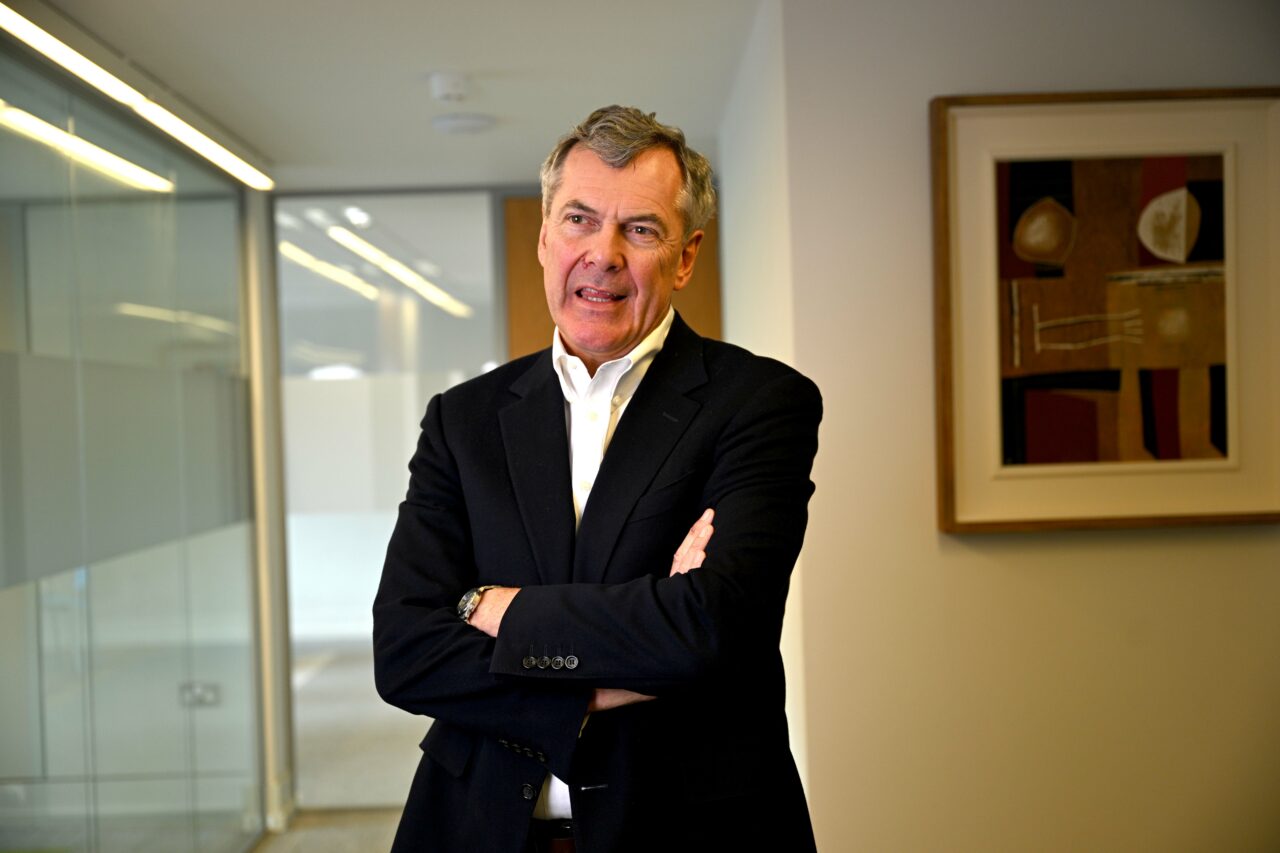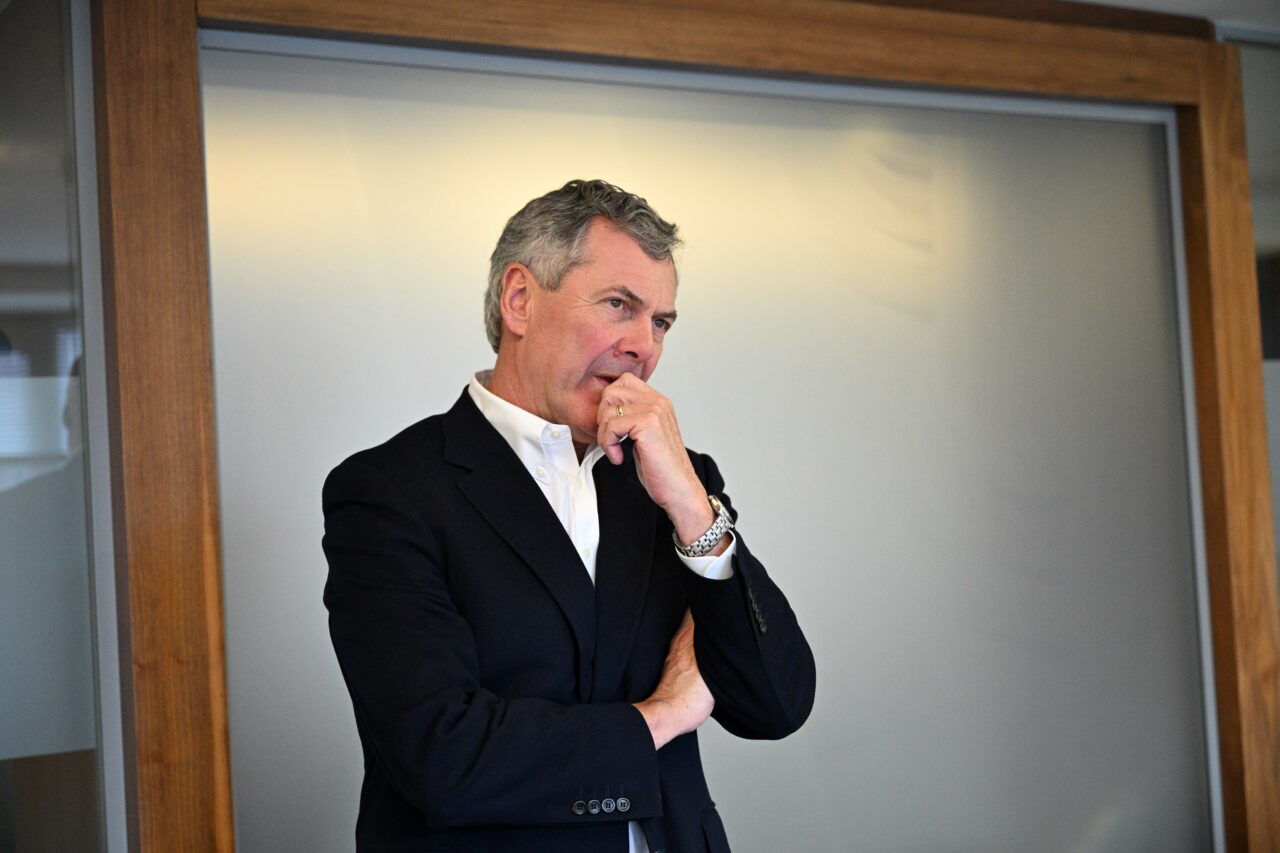The boardroom of Key Capital looks out onto the treetops of St Stephen’s Green. It is adjacent to a 300-year-old tiny cemetery which gives the office building the name Huguenot House, after the French Protestants who fled to Ireland to escape religious persecution.
It is a deliberately quiet room. Its team operates on one side of the building, ensuring confidentiality for clients who can be swiftly brought into meeting rooms at the front of the office.
I’d been in the office a few times previously when Key Capital was the owner of my then employer the Sunday Business Post, a media business it sold in 2018. I never discussed editorial matters, but I’d been there with others on occasions to discuss commercial aspects of running a newspaper.
Conor Killeen, the chairman of Key Capital, founded Key Capital in 2001 after a career in London where he was global head of equities with Dresdner Kleinwort and before that worked in UBS and Schroders. The idea was to bring an international standard of advice to Dublin, at a time when the market was dominated by a small number of players mostly owned by banks.
Over the decades, Killeen has raised more than €100 billion for companies and governments, so he has a deep understanding of both public and private markets. He has worked alongside many senior executives and entrepreneurs.
Corporate deal-making
Key Capital has advised numerous companies on corporate deal-making while running investment management and wealth advisory divisions. Killeen rarely does interviews and he is not about to start today, he assures me with a laugh. But he does want to talk about IDEATE Ireland, a unique competition opportunity for students to put entrepreneurship principles into practice.
Key Capital and PWC are the two pillar corporate sponsors of the competition along with additional support from Each&Other and the Guinness Enterprise Centre. The focus of our conversation is IDEATE, but there is also a bigger theme. It is how young people who take the big risk of joining an Irish start-up are not rewarded in the same way as they are if they take the easier option of joining big international tech companies.
Conor Killeen said Key Capital had decided to sponsor IDEATE after being approached by David Moffitt, a serial entrepreneur and former chief executive of high-end mattress maker Kayfoam Woolfson. This led to a meeting between Key and IDEATE including its cofounder Helen Fullen, an entrepreneur herself, who previously worked with early-stage startups in the NDRC. “We listened to them and we realised it was a really good programme,” Killeen recalled. “It delivers very concentrated added value to entrepreneurs.”
Killeen said he was impressed with the track record of the entrepreneurs who had passed through IDEATE. It started in 2010, when the Irish economy was in deep recession, and Bill McKiernan, the Irish-American founder of fintech Cybersource, decided to do something to help early-stage entrepreneurs. Luminate Medical, Equine Medirecord and Amara Therapeutics are three of the alumni from the competition.
Education is an important asset
In those early years, IDEATE was called the Ireland Funds Business Plan Competition, as it was closely linked to the philanthropic organisation of the same name. “Both David and Helen are first-class,” Killeen said. “When we met with some of the previous candidates and current candidates, we really liked what we saw. Education is a theme the firm is very keen on and we do what we can at university, secondary and primary school levels. As a country, education is one of our most important assets. Fundamentally you are supporting our future if you support education.”
Killeen said Irish universities were developing great ideas but bringing them to market required skill. “This is very commercial. Getting funding for an idea in a university can be onerous. There are quite a lot of conditions to get funding for a big idea in a university. IDEATE essentially allows students to get access to great people and learn about private suppliers of capital. Whether they choose to go that way or not is up to them.
This is a way to hear from the private sector and get a better understanding of what it takes to be an entrepreneur.” The winning prize for a pre-investment idea is €10,000, with second prize getting €7,000 and third €3,000. Killeen said the strength of IDEATE was the experience it gave early-stage entrepreneurs. “There’s a huge amount of learning to be obtained. It teaches people how to address capital more professionally. That is invaluable.”
Greater range of possibility
Conor Killeen graduated with an economics degree from Trinity College Dublin in the 1980s, when the Irish economy was in the doldrums. Up to 70 per cent of his class emigrated. “There were some good jobs here in multinationals or the civil service or the big-four accounting or legal firms. But getting out of Ireland meant a much greater range of possibilities.” Killeen said young people today were emigrating not because of a lack of jobs but because of the housing crisis.
“Many of my year came back. The ones who leave today will be back in time, hopefully, and be better for the experience.” A reason Key Capital is backing IDEATE is to encourage Irish students to run with their ideas rather than sell them or develop them for multinationals.

Is there anything the State could do differently? “Let’s say there’s been 100 early-stage businesses sold in the last ten years for tens or hundreds of millions of euros. There is no encouragement from the State to ensure there is a widely held share ownership within those companies. So instead of one person or five people collecting €100 million, there [should be] a hundred people in that firm sharing 20 per cent of the upside. The top people will still make lots of money but all the other people who contributed along the way will also share in that economic success.”
Killeen said it was “virtually impossible,” to do this in Ireland in a way that made it economically attractive for young people. “If you give someone a share they become liable for tax. That share may turn out to be worthless if the business doesn’t succeed so they’ll have to pay tax on something that ultimately turns out to be worthless.”
Killeen said this put 25- or 30-year-olds off joining startups. “This is a real shame. Giving someone equity in a business should be life-changing. If it works out, it can mean enough to put a deposit on a house or start a business. It is very narrow-minded by the State. We need to think more about how to encourage distributing ownership among people so they share in a company’s success. There must be a way to do this without taxing people who don’t have any money yet.”
Killeen said it was another example of how young people were put at a disadvantage. “We’re talking about thousands of young people who have missed out,” Killeen said. “Owners who make out very well would be very happy to see others share in that success and not just people who were with them from day one.”
Keep asking the questions
What advice would Conor Killeen give a young person starting a business? “The big trick is to spend time meeting people as a young person. I’m not talking about emailing or messaging them or following them on social media, I mean meeting them. It could be meeting your peers or it could be meeting suppliers, prospective hires, future clients. Just hang out with people and develop a curiosity about what’s going on, what caused them to have a hit, how did they come through a rough patch? Listen to people and talk to people. If you’re in a conversation and you have a question, don’t be afraid to ask it.”
Killeen said in between jobs, he used periods of gardening leave to meet people. In 1998, when he finished as global head of equity capital markets in UBS, he estimated he met 200 people as he figured out what to do next.
Who was the most interesting person he met? “Dermot Desmond. He was one of the most fascinating people I ever met.” What did he say? “He gave a picture of his life from when he was in the World Bank and Afghanistan. I think it changed his thinking. He came back and he started tackling the cosy oligopolies, money broking first, then stockbroking.
“But what I was really intrigued by was not only his ability to pick winners but also his ability to sell. I followed his actions, as we all do, and what I was really taken by was, not only could he buy stuff well, he could sell stuff really well. That was a lesson that I got a sense of when I met him. He looked at both sides when he bought something.”
Killeen said a person who had a big influence on his life was Andrew Williams, an investment banker from Schroders who ran for Parliament in Newcastle, England. “He lost. A heavy defeat,” Killeen said. “But he was a big influence, and gave me a real interest in politics.”
He said Williams took him on the campaign trail to Wales to support another Conservative politician called Robert Harvey. “Poor old Robert wasn’t returned but it was an extraordinary experience. Three days campaigning. Getting doors slammed in your face. In the evenings talking about policy positions. Standing on a stump giving a speech in a dairy. My point in saying this is that if you get half a chance as a young person just go out and do something. Meet real people. You’ll learn a lot more than you will by reading yet another heap of nonsense curated for your specific interests on your smartphone.”
“What IDEATE teaches is not just technical. It is about technique. It is about learning how to read people and figure out what they’re looking for. You need to know what people will buy.”
“You’ve got to know how to deliver your message and your product. Very successful people can explain pretty complex products in simple ways,” he said. “One of last year’s winners, ArrayPatch, exemplifies that. Led by Dr Waleed Faisal, ArrayPatch is a wearable microneedle patch that treats local diseases like fungus on the foot. It is a unique technology that will have many applications and multiple different products. IDEATE is very excited to be able to help him and other entrepreneurs like him, and we are very happy to be part of it.”
The IDEATE competition is open to undergraduate, postgraduate or research students or recent graduates within two years from any third-level academic institution or research centre on the island of Ireland. The authors of 10 submissions will be invited to participate in a 10-week mentoring and support program and compete for a €20,000 prize fund. The closing date for entries is March 19. To find out more click here.


